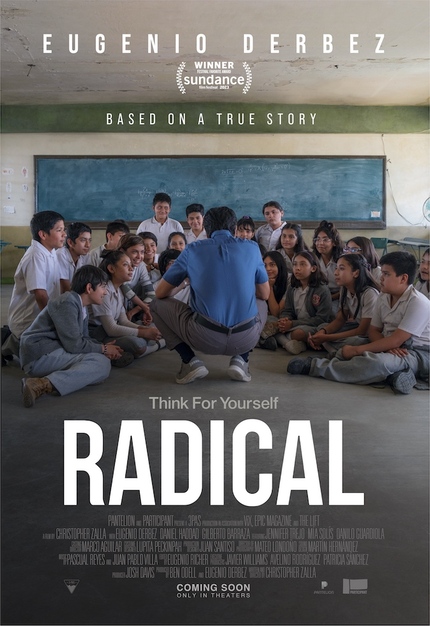RADICAL Review: Sometimes Superheroes Don't Wear Capes, They Teach Instead

Based on Joshua Davis’s 2013 article for Wired, “A Radical Way of Unleashing a Generation of Geniuses,” Radical, a stirring, poignant drama co-written and adapted by Christopher Zalla (Blood of My Blood), literally and figuratively revolves around Jose Urbina Lopez Elementary School in Matamoros, Mexico.
A town on the U.S/Mexico border, Matamoros suffers from crushing poverty, dilapidated infrastructure, and gang-related violence. It’s as hopeless a city or town — depressingly, painfully real by all accounts — as any put on Spanish-language, Mexico-set film since Luis Buñuel’s award-winning classic, Los Olvidados (The Forgotten Ones) almost 75 years ago.
Unlike Issa Lopez’s recent — and it should be added, excellent — horror-thriller hybrid, Tigers Are Not Afraid, Radical centers the drama on the elementary school itself, the local children who regularly attend the school, and the safe haven, however temporary and short-lived, the school represents from that poverty, despair, and violence hovering just outside the school’s walls. Once they exit the school’s doors, however, any protection from the real world’s dangers, real or imagined, ceases altogether, leaving them to navigate crime scenes, blood-stained bodies, and dodge stray gunfire on their way home.
For the teachers and administrators who run the school, however, the school’s educational mission takes second position to winning a monetary bonus for an upcoming standardized test. It’s a simple proposition for them: Collectively score high marks on the test and add a bonus to their bank accounts.
Compromising their ethics to “win” the bonus matters not at all to them. While superficially understandable given the dire socio-economic circumstances around them, it remains both a sign of the deep rot and even deeper corruption permeating the school and the disservice done to the students, most of whom are assumed unworthy of teacher-directed effort beyond the bare minimum.
Taking its narrative cues from Davis’s article and social-realist dramas set in and around educational institutions (e.g., Blackboard Jungle, To Sir With Love, Dead Poets Society, Stand and Deliver, Dangerous Minds), Radical pits a dedicated, idealistic, unorthodox educator, Sergio Juárez Correa (Eugenio Derbez), against the establishment inside the school’s walls and the chaotic violence outside those same walls. Inside, he initially faces opposition from a go along to get along administrator, Chucho (Daniel Haddad), who strongly encourages the reform-minded Juárez Correa to toe the party-establishment line, teach to the test, and go with the flow regardless of the impact (or lack thereof) on Correa’s new students.
Unsurprisingly, the Matamoros-born, 30-something Juárez Correa openly rejects the unworkable status quo and decides to put his “radical” ideas into immediate action in the schoolroom. The radical part of Juárez Correa’s pedagogy involves a seemingly novel concept: giving the students a measure of agency or autonomy in choosing what they learn and how they learn it.
Enamored by the Socratic Method, Juárez Correa allows the students and their innate curiosity, the same curiosity suppressed by the school’s emphasis on teaching to the test (i.e., rote learning), to guide how and what they learn. Even as Correa’s methods proves an almost immediate success, opposition begins to develop among the other teachers and administrators.
Radical coalesces around three individuals among Juárez Correa’s students: Paloma (Jennifer Trejo), a math savant who dreams of becoming an aerospace engineer; Nico (Danilo Guardiola Escobar), more clever and insightful than traditionally smart; and Lupe (Mia Fernanda Solis), inspired by Juárez Correa’s encouragement to see a world beyond her day-to-day experiences. Each, in turn, faces seemingly insurmountable odds: Paloma, abject poverty, marginally surviving on the town’s outskirts with her father; Nico, the inexorable pull of gang life represented by his older brother, a gang member eager for Nico to join: and Lupe, relegated by her hard-working parents into the caretaker role to her younger siblings.
While Radical rarely strays from overly familiar tropes or predictably uplifting plot turns, it’s also a perfect example of what a skillful, talented filmmaker, working from a sturdy script, a granular-specific setting, sharply drawn characters, and remarkably gifted, expressive performers, can do to elevate that formula into something altogether memorable and moving. Ultimately, Radical’s celebrates student-first teaching both in general and in the particular experiences of Juárez Correa, Paloma, Nico, and Lupe.
Not coincidentally, the real-life Paloma Noyola Bueno received the highest math scores in the country, while two of her classmates scored in the highest percentage. Another three students in Juárez Correa’s class received the highest possible scores in Spanish. Sometimes, teaching matters. Sometimes, teachers matter even more.
Radical opens Friday, November 3, only in movie theaters, via Pantelion Films and Participant Media. Visit the official site for more information, showtimes, and tickets.
Radical
Director(s)
- Christopher Zalla
Writer(s)
- Christopher Zalla
- Joshua Davis
Cast
- Eugenio Derbez
- Daniel Haddad
- Jennifer Trejo







